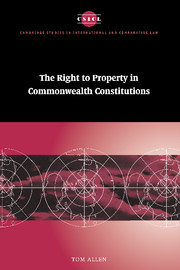Book contents
- Frontmatter
- Contents
- Table of cases
- Acknowledgements
- 1 Introduction
- 2 The right to property at common law
- 3 The development of written rights to property
- 4 Constitutional interpretation
- 5 The meaning of property
- 6 Acquisition and deprivation
- 7 Public purpose
- 8 Compensation
- Bibliography
- Index
- CAMBRIDGE STUDIES IN INTERNATIONAL AND COMPARATIVE LAW
7 - Public purpose
Published online by Cambridge University Press: 28 July 2009
- Frontmatter
- Contents
- Table of cases
- Acknowledgements
- 1 Introduction
- 2 The right to property at common law
- 3 The development of written rights to property
- 4 Constitutional interpretation
- 5 The meaning of property
- 6 Acquisition and deprivation
- 7 Public purpose
- 8 Compensation
- Bibliography
- Index
- CAMBRIDGE STUDIES IN INTERNATIONAL AND COMPARATIVE LAW
Summary
This chapter is concerned with the purposes for which the legislature may exercise its powers over private property. Early civilian writers agreed that the sovereign powers over property could only be exercised in the public interest, although the precise nature of the public interest was disputed. In the English constitution, the principle of parliamentary supremacy has meant that property can be taken for any purpose, public or private. Nevertheless, the legislature usually gives some indication of the purposes for which property may be taken, and the courts do not allow compulsory powers of acquisition to be used for an improper purpose.
Most Commonwealth constitutions contain some limitations on the purposes for which the legislature may authorise the acquisition of property. India's independence Constitution stated that property could not be expropriated ‘for public purposes’ unless compensation was paid. A number of Nigerian-model constitutions include detailed purpose clauses. For example, the Constitution of Kenya states that property may be taken only if it is ‘necessary in the interests of defence, public safety, public order, public morality, public health, town and country planning or the development or utilization of property so as to promote the public benefit’. Other constitutions are still more detailed; for example, the Constitution of Botswana repeats the list of purposes given in the Constitution of Kenya, and adds that property may be taken ‘in order to secure the development or utilization of the mineral resources of Botswana’.
- Type
- Chapter
- Information
- The Right to Property in Commonwealth Constitutions , pp. 201 - 222Publisher: Cambridge University PressPrint publication year: 2000

